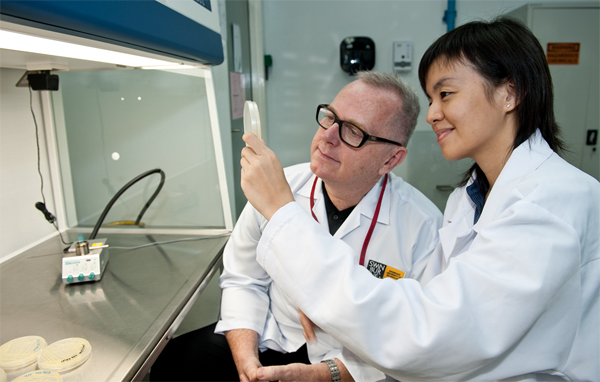KUCHING – It is now pretty much agreed that the age of petroleum is entering its terminal phase ‐ however much fossil fuel remains to us in the world, supplies are not endless. Consequently, the development of viable alternative fuels is gathering pace. Researchers at Swinburne University, Sarawak campus, have extracted lipids (oils) from algae such as those in the genus Chlorella which can used as precursors for the production of biofuel for diesel engines.
Swinburne Sarawak, has been involved in research on microalgal lipids since 2008. This has been a concerted effort by Swinburne biotechnologists and researchers to accumulate the expertise and know‐how to help solve one of the most pressing problems facing the modern world ‐ sourcing the energy required for future development. Interest in the commercial potential of algal biotechnology has seen a dramatic increase in several Malaysian states including Sarawak in recent times.
The Swinburne project centres around the chosen model, Chlorella protothecoides, which belongs to a category called microalgae because of its size.
“This alga has the ability to use either light or sugars as its energy source for cell growth and the production of metabolites such as lipids, from which biofuel can be produced. Fermentation studies were undertaken at Swinburne to develop an understanding of the kinetics of cell growth and lipid biosynthesis,” said Associate Professor Clem Kuek who heads the project. This knowledge, he said, is essential for the accurate and detailed evaluation of the various options for biodiesel production via microalgae.
“Under various conditions of production, the efficiency with which raw material is converted by the alga into the biofuel precursor was examined. It is from such mass balances that the economics of biofuel production can be determined,” Kuek said.
“As always, science needs not only to be doable, it needs to lead to affordable outcomes and processes,” said Professor Helmut Lueckenhausen, Pro Vice‐Chancellor and Chief executive of Swinburne Sarawak Campus. “This project begins the contribution of Swinburne Sarawak to the development of algal biotechnology in Sarawak,” he said.
Jennifer Ho, who undertook the studies as her Master of Science project said, “It has been a great experience at Swinburne working on the production end for a renewable source of energy especially when I was previously working on the opposite end of the spectrum ‐ cleaning up fossil fuel contamination.” She added, “The project has included sleep‐deprived nights on campus when 6‐hour culture samples were needed to be collected over 2‐day experiments.”
The outcomes from this project are enabling Swinburne to make a significant contribution to the Chlorella protothecoides cells at 40X magnification. The culture of microalga under controlled conditions. Assaying lipid content of the microalga. development of algal biotechnology in Sarawak, ‐ for example, in the screening of local algae for their biofuel potentials. Another specific example of where Swinburne’s attention to this aspect of biotechnology is producing tangible results can be seen in its collaboration with a Sarawakian aquaculture company to examine the culture of particular microalgae for incorporation into fish feed to increase the profile of highly‐unsaturated fatty acids (omega‐3 oils) of the empurau fish that the company produces. These empurau are currently exported internationally, including to China.
Commanding the technology for the controlled culture of algae enables economic exploitation of the chemical resources which reside within useful algae many of which can be found in Sarawak’s marine and freshwater biodiversity. For example, the Mitsubishi Corp Energy Business Group (Mitsubishi Energy), which is involved in the oil and gas industry in Bintulu, will be collaborating with the Sarawak Biodiversity Centre ‐ with which Swinburne also has a collaboration ‐ to explore algal biodiversity in Sarawak as a source of renewable energy (Bernama article, 28 June 2011).


